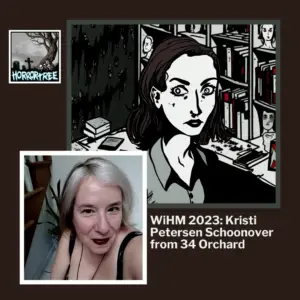Horrortree - March 25
Writing Advice from Kristi: I thought screenwriting would be difficult for me, but it’s really only turned out to be the formatting that’s the tough part. It’s just being aware that everything has to be communicated in either dialogue or imagery, including the character’s internal emotions (which, in large part, is left up to the actors). This has been an exciting journey so far, but truth be told—I’ve always started my short stories by writing bits of dialogue first anyway. It’s just that the pieces around it are a bit different.
Read a lot of quality short stories, in all genres, and understand that’s it’s a different form than novels—the shorter the form, the harder it is to make sure everything significant is included. Write what you feel, and emotionally engage with the subject matter. Make sure that the story doesn’t have holes, or just “skips” things; it needs to be complete. And lastly, make sure it’s really well-edited. Read it aloud a few times. Polish is important. The editor is there to ensure the work shines and is as perfect as possible—not to fix a hundred simple errors the writer didn’t attend, and I’m seeing more and more of that lately (and I’m not alone—I’m hearing about increases in this from other editors, too). A clean manuscript that has very few errors really does count—a good story that’s sloppy and needing a ton of work is always going to lose against a good story that needs barely any correction. If you want to get published, do the work, and put in the time.
